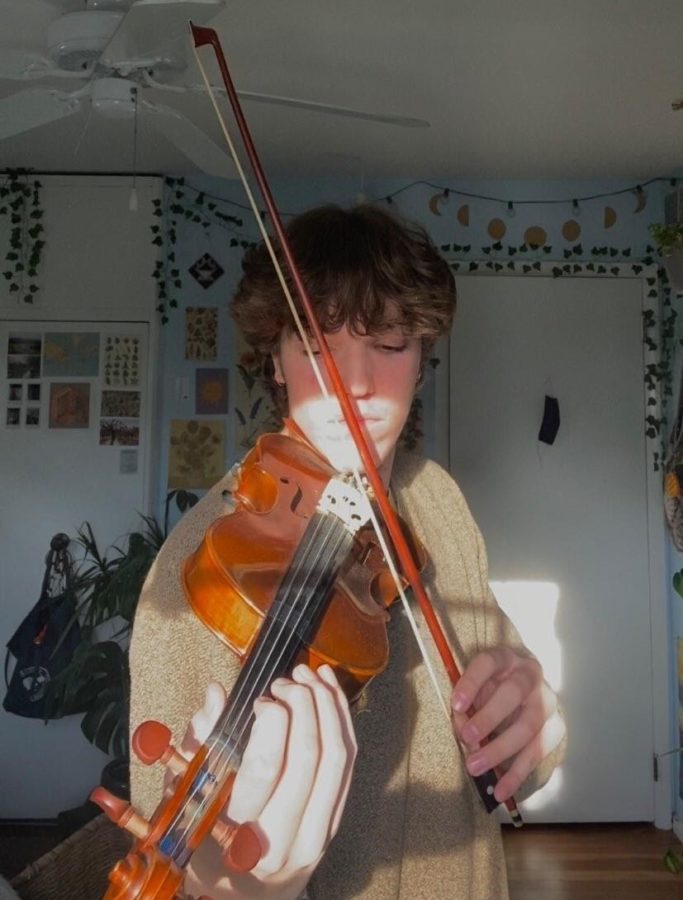The Classics with Lucas: Carver Conversations Guest Issue
April 29, 2022
11th grader Lucas Rose’s (he/him) earliest experiences in music were almost unremarkable: “Well I really liked music class,” he recalled, “but I don’t think I ever viewed the cello as a huge thing in my life.” A bulletin board that tracked his and his elementary school classmates’ progress is what called him to action; Lucas wanted to be the best. “That propelled me into caring more about music and finding more out about the instrument and just wanting to learn more.”
Now, music is one of the focal points of Lucas’ life: “Being a cellist and musician and string player is a huge part of my personality.” Over Zoom, he sent me Spotify links to pieces from the 19th century, his favorite being Dvořák’s String Quartet No. 12 (also known as American Quartet). “I’m pretty sure it’s supposed to be based around war, like The American. I always picture a soldier or a platoon of soldiers walking back to their home base.” A shifting idea of American culture emerges from the continued consumption of American classics. “I don’t know how war works,” he admitted through laughs.
After explaining the song’s backstory, he played American Quartet on his violin, determined to convey his experience with the music through the melodies themselves. His passion for classical music is not generally shared amongst his contemporaries, a truth that he has come to accept: “I have a greater connection to my music and my instrument.” Perhaps the goal is not to bring classical music to the mainstream, but instead, to promote a deeper and more sentimental connection to music of all genres.
But the best way for Lucas to share his passion for classical music is through his love for the animated Studio Ghibli movies. His favorite is the 1995 Whisper of the Heart, directed by Yoshifumi Kondō. In it, a 14-year-old girl comes of age through her love for reading and worldly curiosity. She resists the digitization process that defined the late 90s by studying the checkout cards in every book she reads, preserving physical reminders of booklovers past. But for Lucas, it’s easy to identify with the story’s love interest, a teenage boy with aspirations to be a violin-maker — who is initially introduced to the main character when she begins recognizing his name in checkout cards. The boy’s dreams can be traced to his grandfather’s antique shop where musical instruments line the shelves. Family is also one of the inceptions in Lucas’ musical journey: “My sister plays piano, ukulele, and she sings. My brother plays guitar. My mom plays piano, and my dad drums.”
Yuji Nomi composed the soundtrack backing Whisper of the Heart, a departure from Joe Hisashi as the usual musical collaborator for Ghibli. The instruments in Nomi’s works are sparser — defining each note more carefully — and his austere compositions complement the whimsical severity of early adolescence. “I think it does a really good job of capturing busy everyday life moments,” Lucas said, “It’s just — I don’t know. It makes me feel kind of nostalgic and appreciative of life.” The centerpiece of the Whisper of the Heart soundtrack is a reimagining of John Denver’s Take Me Home, Country Roads that fixates on the main character’s hometown of Tama city. Lucas believes that music can transform a story: “Music just really unearths emotions you’re supposed to be feeling during a particular scene; there’s so many ways you can interpret it while just mainly watching.” Nomi’s Concrete Roads exposes the anxieties of growing older that lie on the underbelly of Whisper of the Heart and many other Ghibli films.
Amidst the great narrative of life, music transforms people. “It’s helped me realize going outside of what most people do or are used to is kind of refreshing,” Lucas exhaled, “And I don’t care if people think I’m weird.”
Special thanks to Catonsville High’s Lucas for being a guest on this issue! You can connect with him on Instagram @lucasrose__ .
`
